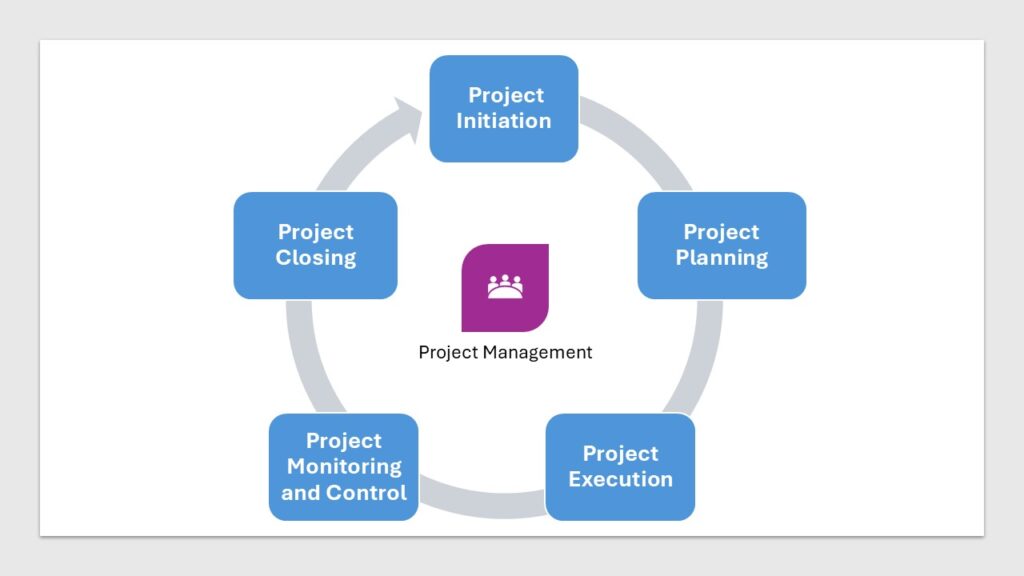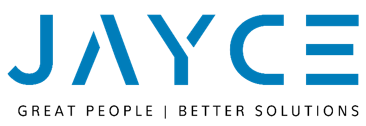
Why This Process is Important?
At JAYCE Consulting, we prioritize delivering consistent and reliable results through a standardized project management process. This approach ensures that every project follows a consistent methodology, resulting in predictable and reliable outcomes. By achieving project objectives and maintaining high-quality standards, we enhance client satisfaction, fostering long-term relationships and positive referrals. Our meticulous planning and efficient resource management minimize waste, optimize profitability, and deliver value to our clients. We proactively identify and manage risks to prevent project failures or delays. Moreover, our commitment to continuous improvement through post-project reviews allows us to refine our processes and elevate our service quality continually.
Our Proven process for Project Management
1. Project Initiation
Objective: Define the project’s scope, objectives, and stakeholders.
Steps:
- Project Proposal: Develop a proposal outlining the project’s goals, scope, deliverables, timeline, and budget.
- Stakeholder Identification: Identify key stakeholders, including clients, team members, and other relevant parties.
- Project Charter: Create a project charter that formally authorizes the project and provides a clear mandate for the project manager and team.
Importance: Establishes a clear understanding of the project’s purpose, scope, and expectations, ensuring all stakeholders are aligned from the start.
Key Benefits:
- Clear project vision and objectives.
- Defined roles and responsibilities.
- Better alignment with client expectations.
2. Project Planning
Objective: Develop a detailed roadmap for the project, including timelines, resources, and risk management.
Steps:
- Work Breakdown Structure (WBS): Break down the project into manageable tasks and activities.
- Resource Planning: Allocate necessary resources, including personnel, tools, and budget.
- Schedule Development: Create a detailed project timeline with milestones and deadlines.
- Risk Management: Identify potential risks and develop mitigation strategies.
- Communication Plan: Establish how information will be communicated among stakeholders.
Importance: Provides a clear roadmap and ensures that resources are allocated efficiently, helping to prevent scope creep and delays.
Key Benefits:
- Detailed planning reduces uncertainties.
- Efficient resource utilization.
- Proactive risk management.
3. Project Execution
Objective: Implement the project plan and deliver the expected outcomes.
Steps:
- Team Mobilization: Assemble the project team and ensure they understand their roles.
- Task Execution: Carry out the tasks as outlined in the project plan.
- Quality Assurance: Monitor and control project work to ensure it meets the required quality standards.
- Change Management: Manage changes to the project scope, schedule, and resources.
Importance: Ensures that the project stays on track and delivers the intended outcomes with high quality.
Key Benefits:
- Smooth execution of project tasks.
- Consistent quality standards.
- Effective handling of changes and issues.
4. Project Monitoring and Control
Objective: Track project progress and performance to ensure alignment with the plan.
Steps:
- Performance Metrics: Define and track key performance indicators (KPIs) such as time, cost, and quality.
- Status Reporting: Provide regular updates to stakeholders on project status, issues, and risks.
- Issue Management: Identify, document, and resolve any issues that arise during the project.
- Budget Tracking: Monitor project expenses against the budget.
Importance: Keeps the project on track by identifying deviations early and taking corrective actions.
Key Benefits:
- Early detection of potential problems.
- Data-driven decision-making.
- Transparency and accountability.
5. Project Closing
Objective: Formally close the project and review its outcomes.
Steps:
- Final Deliverables: Ensure all project deliverables are completed and accepted by the client.
- Project Review: Conduct a post-project review to evaluate what went well and what could be improved.
- Documentation: Compile all project documents and lessons learned.
- Client Handoff: Transfer all necessary information, documents, and deliverables to the client.
Importance: Ensures that all project obligations are met and provides valuable insights for future projects.
Key Benefits:
- Formal closure and sign-off.
- Knowledge transfer and lessons learned.
Looking to streamline your projects and achieve outstanding results? Partner with JAYCE Consulting for expert project management solutions that drive success. Contact us today to learn how we can help you deliver projects on time, within budget, and with exceptional quality. Let’s make your next project a success!
